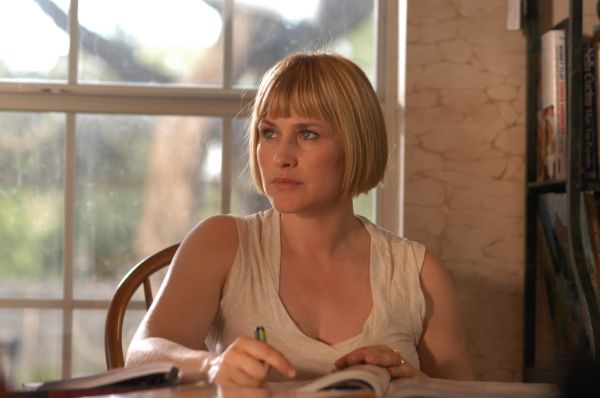
[Static image created using stills from this promotional gif.]
This weekend, I saw Boyhood, the new film by Richard Linklater which he made by shooting a few days a year over 12 years, thus showing all the characters naturally aging over the course of the film.
I am generally a fan of Linklater's work—I really love his "Before" series with Julie Delpy and Ethan Hawke—and I was very excited to see this film, which has met with ridiculously high praise from critics. (It currently has a perfect score of 100 on Metacritic.) I was also approaching it with a bit of dubiousness, given the title, which felt a little too universal to me.
And my expectations were met, on both counts.
The film is genuinely extraordinary. I am in awe of the ambition and patience that went into its making.
Even more so because it's not gimmicky. The aging of the primary characters—Mason, the boy of the title, played by Ellar Coltrane; Samantha, his sister, played by Linklater's daughter Lorelei Linklater; their mother, played by Patricia Arquette; and their father, played by Ethan Hawke—is evident but not the central focus, and the story moves along in a natural way.
One of the things I loved best about the film is that there is no contrived tension, no invented dramatics to manipulate the audience. There are, for example, scenes of Mason fucking around with his friends, doing vaguely dangerous unsupervised things, and a million lesser coming of age stories have primed us to expect disaster, but, more like real life, it's just one of those times that kids do stupid shit and survive unscathed.
It's a very compelling film, which captures the feeling of what being young is like for a whole lot of people. But not everyone, of course. Not even all boys. Which is my one complaint about the film: That title is awful.
Originally, the title was 12 Years, which is so much better, but 12 Years a Slave caused a title change:
The name frames the film as the boy's story, though in execution, every character owns a piece. "To me, Boyhood was a limited title," admits Linklater, who had wanted to call it 12 Years, until that other film won three Oscars. "It's very much his point of view, but it could be Girlhood or Motherhood or Familyhood."Except it couldn't—because it's no more a universal story about girlhood or parenthood or familyhood than it is about boyhood. Mason is a straight, white, thin, able-bodied boy, who moves between classes throughout his childhood in the US, and his boyhood looks fundamentally different from other boyhoods.
Which is okay. Very few stories are truly universal. But that's why 12 Years would have been so much better a title than anything which suggests universality.
It is, however, a very good film, irrespective of the problems with its title.
Mason's sister and divorced parents feature prominently in every part of the film, too, and I wish Linklater would have done a film from each of their perspectives, seeing those 12 years through four different sets of eyes. Which is an unequivocally unfair ask, I know! It's just that I want to see the same 12 years from Patricia Arquette's eyes so badly.

Arquette gives an amazing performance as Mason's mother, a woman who became a parent to two children at a young age, who becomes a single mother after their father, her first husband, takes off to Alaska, and who then goes back to school to become a (beloved) professor—navigating along the way two more marriages, one of them profoundly abusive. Hers is a story of survival and resiliency and strength, and her children's lives are shaped important ways by her choices, or her lack of choices. Her life is not background to theirs; it is definitional.
The thing is, I'm not certain that Mom's, or any of the other possible versions, would have been so well received—which is not Linklater's fault. Judy Berman wrote an interesting piece wondering what might have been different if it had been Girlhood rather than Boyhood. And she's right that it would have been gendered, and genre-ed, in a way that Boyhood hasn't been.
Which is ultimately, in addition to the radical filmmaking process itself, what makes Boyhood certainly one of the most interesting films I've seen in a long time: It's a story about a boy, telling one of the most complex stories about a woman that's been onscreen in years.




Shakesville is run as a safe space. First-time commenters: Please read Shakesville's Commenting Policy and Feminism 101 Section before commenting. We also do lots of in-thread moderation, so we ask that everyone read the entirety of any thread before commenting, to ensure compliance with any in-thread moderation. Thank you.
blog comments powered by Disqus